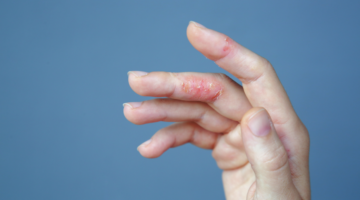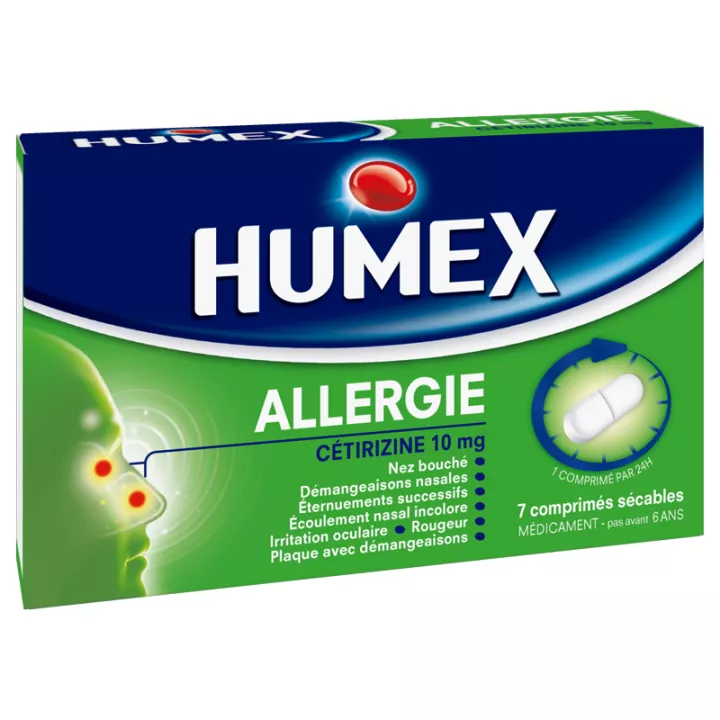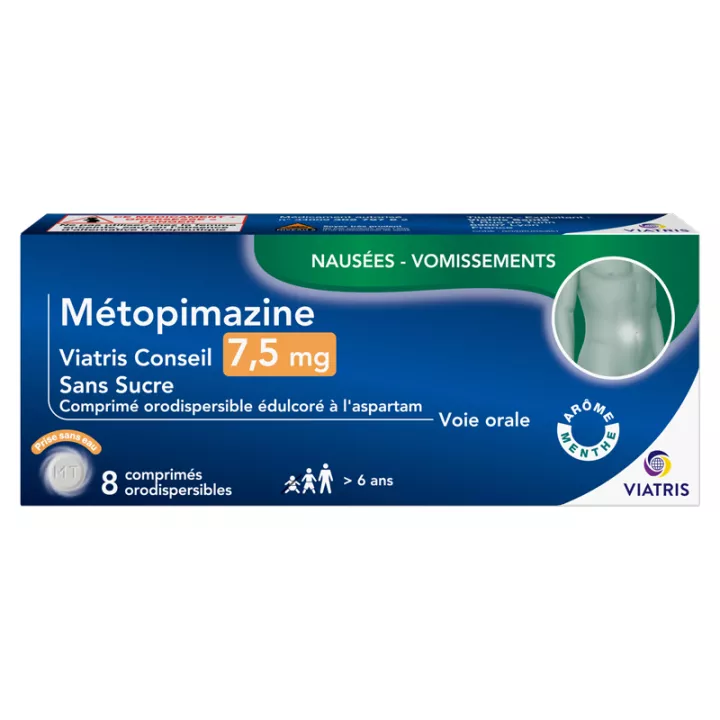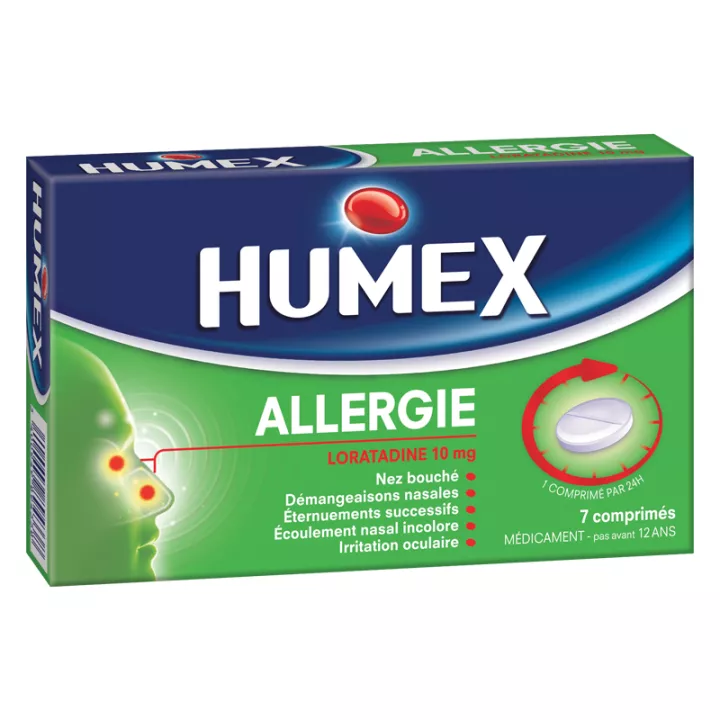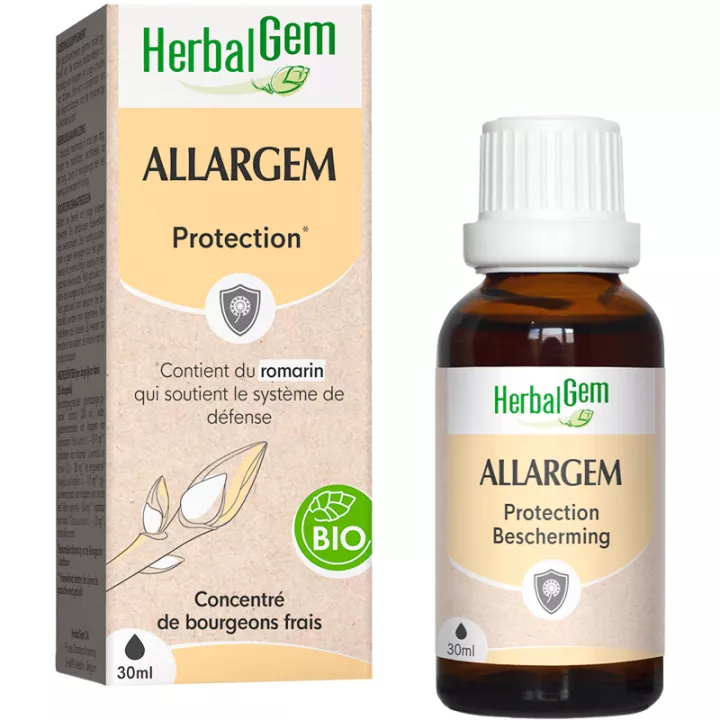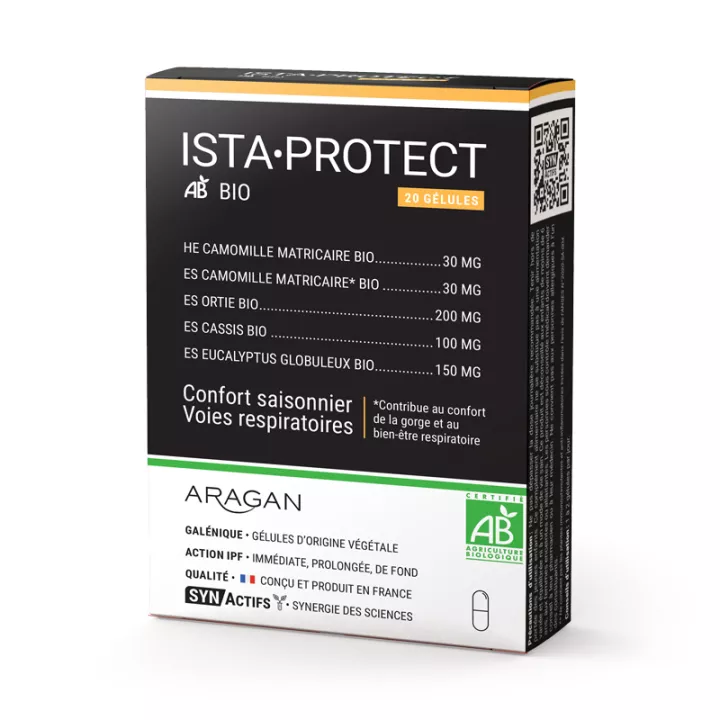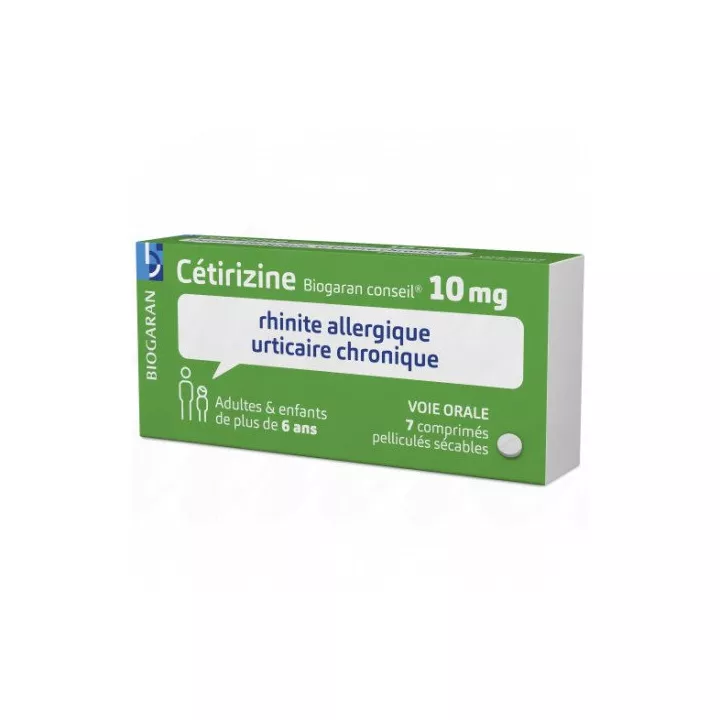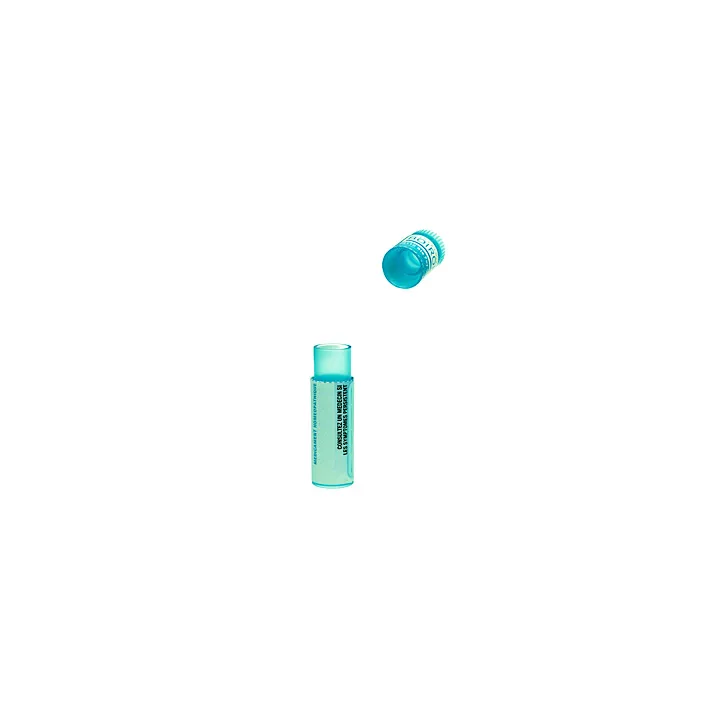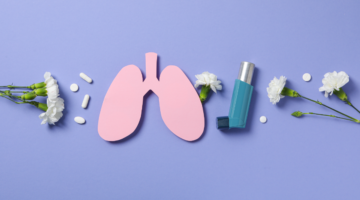NOTICE
ANSM - Last updated: 19/06/2017
Name of the medicinal product
CETIRIZINE BIOGARAN TIP 10 mg film-coated tablet
Cetirizine dihydrochloride
framed
Please read this leaflet carefully before you start taking this medicine because it contains important information for you.
You should always take this medication exactly as prescribed in this leaflet or by your doctor, pharmacist or nurse.
· Keep this leaflet. You might need to read it again.
· Ask your pharmacist for advice or information.
· If you experience any of the side effects, talk to your doctor, pharmacist or nurse. This also applies to any side effects not mentioned in this leaflet. See section 4.
· You should contact your doctor if you experience no improvement or feel less well after 3 days.
What is in this leaflet?
1. What is CETIRIZINE BIOGARAN CONSEIL 10 mg, film-coated tablet and in which cases it is used?
2. What information should I take before taking CETIRIZINE BIOGARAN CONSEIL 10 mg film-coated tablet?
3. How to take CETIRIZINE BIOGARAN CONSEIL 10 mg film-coated tablet?
4. What are the possible side effects?
5. How to store CETIRIZINE BIOGARAN CONSEIL 10 mg film-coated tablet?
6. Package contents and other information.
1. WHAT IS CETIRIZINE BIOGARAN COUNCIL 10 mg film-coated, scored tablet AND WHAT IT IS USED FOR?
Pharmacotherapeutic group - ATC code: R06AE07.
Cetirizine dihydrochloride is the active substance of CETIRIZINE BIOGARAN CONSEIL.
CETIRIZINE BIOGARAN CONSEIL is an antiallergic drug.
In adults and children from 6 years of age, CETIRIZINE BIOGARAN CONSEIL is indicated:
· for the treatment of nasal and ocular symptoms of seasonal or perennial allergic rhinitis;
· for the treatment of symptoms of chronic urticaria (idiopathic chronic urticaria). A medical opinion is recommended for idiopathic chronic urticaria.
2. BEFORE YOU TAKE CETIRIZINE BIOGARAN COUNCIL 10 mg film-coated, scored tablet?
Do not take CETIRIZINE BIOGARAN CONSEIL 10 mg film-coated tablet:
· if you are allergic to cetirizine dihydrochloride, hydroxyzine, piperazine derivatives (related substances) or any of the other ingredients of this medication mentioned in section 6;
· if you have severe kidney disease (severe renal insufficiency with a creatinine clearance of less than 10 ml / min).
Warnings and Precautions
Talk to your doctor, pharmacist or nurse before taking CETIRIZINE BIOGARAN CONSEIL 10 mg film-coated tablet.
Warnings and Precautions
If you have kidney failure, seek advice from your doctor; if necessary, you should take a lower dose. The appropriate dosage will be determined by your doctor.
If you have problems with urination (due to problems with the spinal cord or bladder or prostate problems), ask your doctor for advice.
If you are an epileptic or if you are at risk of seizures, ask your doctor for advice.
No specific interaction was observed between cetirizine at the recommended doses and alcohol (up to a blood concentration of 0.5 per thousand (g / l) corresponding to a glass of wine). However, no data are available when taking higher doses of cetirizine and alcohol. Therefore, as with any other antihistamine, it is recommended to avoid taking alcohol with CETIRIZINE BIOGARAN CONSEIL.
If you have to undergo tests for the diagnosis of allergy (skin test for example), this drug should be stopped at least 3 days before its realization because it can modify the results. Ask your doctor what to do before performing tests for the diagnosis of allergy.
The use of this medication is not recommended in patients with galactose intolerance, Lapp lactase deficiency or glucose or galactose malabsorption syndrome (rare hereditary diseases).
Children and Youth
Do not give this medication to children under 6 years of age because the tablet form does not allow for necessary dose adjustments.
Other medicines and CETIRIZINE BIOGARAN TIP 10 mg, film-coated tablet
Inform your doctor or pharmacist if you are taking, have recently taken or may take any other medicines.
CETIRIZINE BIOGARAN TIP 10 mg, film-coated tablet with food and beverages
The absorption of cetirizine contained in CETIRIZINE BIOGARAN CONSEIL is not affected by the concomitant use of food.
Pregnancy, breast-feeding and fertility
If you are pregnant or breastfeeding, think you may be pregnant or plan a pregnancy, ask your doctor or pharmacist for advice before taking this medicine.
Ask your doctor or pharmacist for advice before taking any medicine.
As with other medicines, the use of CETIRIZINE BIOGARAN TIP should be avoided during pregnancy.
Inadvertent use during pregnancy should not have a deleterious effect on the fetus. However, this medication should be administered only if necessary and after medical advice.
Cetirizine passes into breast milk. This is why you should not take CETIRIZINE BIOGARAN CONSEIL during breastfeeding without asking your doctor for advice.
Driving and using machines
The clinical studies did not show any alteration in alertness, reaction time or ability to drive after administration of CETIRIZINE BIOGARAN CONSEIL at the recommended doses.
However, if you are likely to drive a vehicle, perform potentially hazardous activities, or use machines you must first evaluate your response to treatment with CETIRIZINE BIOGARAN CONSULTING.
You should not exceed the recommended dose.
CETIRIZINE BIOGARAN COUNCIL 10 mg film-coated tablet contains lactose.
If your doctor has told you about an intolerance to some sugars, contact your doctor before taking this medicine.
3. HOW TO TAKE CETIRIZINE BIOGARAN COUNCIL 10 mg film-coated tablet?
Always take this medication exactly as prescribed in this leaflet or as directed by your doctor, pharmacist or nurse. Check with your doctor, pharmacist or nurse if in doubt.
How and when should you take CETIRIZINE BIOGARAN COUNCIL?
These instructions should be followed unless your doctor has given you different instructions on how to use CETIRIZINE BIOGARAN TIP.
Follow these instructions, otherwise CETIRIZINE BIOGARAN TIP may not be completely effective.
The tablets should be swallowed with a drink.
The tablet can be divided into 2 equal doses.
Adults and adolescents over 12 years:
The recommended dose is 10 mg once daily, ie 1 tablet.
This medication is available in other forms that may be more appropriate for children, ask your doctor or pharmacist.
Children from 6 to 12 years:
The recommended dose is 5 mg twice daily, half a tablet twice daily.
This medication is available in other forms that may be more appropriate for children, ask your doctor or pharmacist.
Renal failure:
In patients with moderate renal impairment, the dose will be reduced to 5 mg once daily.
If you have a serious kidney disease, please contact your doctor who can adjust the dose accordingly.
If your child has kidney disease, please contact your doctor who can adjust the dose to your child's needs.
If you think that the effect of CETIRIZINE BIOGARAN TIP is too weak or too strong, consult your doctor.
Duration of treatment
The duration of treatment depends on the type, duration and your symptoms and is determined by your doctor.
If you take more CETIRIZINE BIOGARAN TIP 10 mg film-coated tablet than you should
Immediately consult your doctor or pharmacist. . Your doctor will decide, if necessary, what to do.
In case of overdose, the side effects described below may occur with an increased intensity. Unusual effects such as confusion, diarrhea, dizziness, fatigue, headache, feeling sick, pupil dilation, itching, restlessness, sedation, drowsiness, stupor, abnormal increase in heart rate, tremors and urinary retention have been reported.
If you forget to take CETIRIZINE BIOGARAN CONSEIL 10 mg, film-coated tablet
Do not take a double dose to make up for a missed dose.
If you stop taking CETIRIZINE BIOGARAN CONSEIL 10 mg, film-coated tablet
Not applicable.
If you have any further questions on the use of this medication, ask your doctor, pharmacist or nurse for more information.
4. WHAT ARE POSSIBLE SIDE EFFECTS?
Like all medicines, this medicine may cause side effects, although not everybody gets them.
· The following undesirable effects are rare or very rare; however, in case of onset, you should immediately stop taking your medicine and consult your doctor: Allergic reactions, including severe reactions and angioedema (severe allergic reaction causing swelling of the face and throat).
These reactions may occur immediately or in a delayed manner in relation to drug intake.
The frequency of possible side effects listed below is defined using the following convention:
Common: 1 to 10 out of 100 patients.
Uncommon: affects 1 to 10 of 1000 patients.
Rare: concerns 1 to 10 patients out of 10,000.
Very rare: concerns less than 1 in 10,000 patients.
Indeterminate: Can not be estimated from the available data.
Common Side Effects
· Drowsiness.
· Sensations dizzy, headaches.
· Pharyngitis, rhinitis (in children).
· Diarrhea, nausea, dryness of the mouth.
· Tired.
Uncommon side effects
· Restlessness.
· Paresthesia (abnormal tactile sensation in the skin).
· Abdominal pain.
· Pruritus (itching), rash.
· Asthenia (intense fatigue), malaise.
Rare side effects
· Allergic reactions, sometimes severe (very rare).
· Depression, hallucinations, aggressiveness, confusion, insomnia.
· Convulsions.
· Tachycardia (heartbeat too fast).
· Abnormal liver function.
· Urticaria.
· Edema (swelling).
· Weight gain.
Very rare side effects
· Thrombocytopenia (decreased blood platelets).
· Tics (repeated involuntary muscle contractions).
· Syncope, dyskinesia (involuntary movements), dystonia (abnormally prolonged muscular contraction), tremors, dysgeusia (altered taste).
· Blurred vision, accommodation problems (difficulty seeing clearly), oculogyral seizures (uncontrolled circular movements of the eyes).
· Angioedema (severe allergic reaction causing swelling of the face and throat), fixed pigmented erythema.
· Urine elimination disorders (nocturnal incontinence, pain and / or difficulty passing urine).
· Undesirable effects of unknown frequency.
· Increased appetite.
· Amnesia, memory problems.
· Suicidal Ideas.
· Vertigo (impression of rotation or movement).
· Urinary retention (inability to completely empty the bladder).
If you develop any of the side effects listed above, please tell your doctor. At the first signs of allergic reaction, stop taking CETIRIZINE BIOGARAN CONSEIL. Your doctor will assess the severity and decide what to do if necessary.
Declaration of side effects
If you experience any side effects, talk to your doctor or pharmacist or nurse. This also applies to any side effects not mentioned in this leaflet. You can also report adverse reactions directly via the national reporting system: National Agency for the Safety of Medicines and Health Products (ANSM) and network of Regional Centers of Pharmacovigilance - Website: www.ansm.sante.fr.
By reporting adverse reactions, you are helping to provide more information about the safety of the drug.
5. HOW TO STORE CETIRIZINE BIOGARAN CONSEIL 10 mg film-coated tabletable?
Keep this medicine out of the reach and sight of children.
Do not use this medicine after the expiry date which is stated on the carton and blister. The expiry date refers to the last day of that month.
No special storage conditions.
Do not throw any medicines into drains or rubbish. Ask your pharmacist to remove any medications you are no longer using. These measures will help protect the environment.
6. PACKAGE CONTENTS AND OTHER INFORMATION
What CETIRIZINE BIOGARAN CONSEIL 10 mg contains, film-coated tablet
· The active substance is:
Cetirizine dihydrochloride ............................................... .................................................. ... 10 mg
For a scored film-coated tablet.
· The other components are:
Core: lactose monohydrate, microcrystalline cellulose, anhydrous colloidal silica, corn starch, talc, magnesium stearate.
Pelletizing : white OPADRY [hypromellose (E464), lactose monohydrate, titanium dioxide (E171), macrogol 4000, sodium citrate].
What is CETIRIZINE BIOGARAN CONSEIL 10 mg film-coated tablet and contents of the pack
This medication is in the form of a scored film-coated tablet. Box of 7 tablets.
Marketing Authorization Holder
BIOGARAN
15, BOULEVARD CHARLES DE GAULLE
92700 COLOMBES
Marketing Authorization Operator
BIOGARAN
15, BOULEVARD CHARLES DE GAULLE
92700 COLOMBES
Maker
CHANELLE MEDICAL LTD
LOUGHREA, CO. GALWAY
IRELAND
Names of the medicinal product in the Member States of the European Economic Area
Not applicable.
The last date on which this leaflet was revised is:
[to be completed later by the holder]
Other
Detailed information on this medicine is available on the ANSM website (France).
Health Education Council:
a) What is an allergy, what is an allergic reaction?
Allergy is an overreaction of our body to substances it considers harmful: allergens. Allergens are the factors and substances triggering allergy and associated disorders.
During repeated and intensive contacts of our body with the allergen, an allergic reaction is triggered.
The allergic reaction refers to all symptoms appearing a few minutes or hours after exposure to allergens. These allergens come from plants, animal hair, food, dust mites, molds or are substances of occupational origin.
This allergic reaction causes the release in the body of substances such as the histamine responsible for the disorders felt.
Like any allergic disease, it is important to consult a doctor at least once. IT SHALL DETERMINE IN PARTICULAR THE NEED TO CARRY OUT AN ALLERGOLOGICAL BALANCE SHEET.
b) How to recognize allergic rhinitis, seasonal or non-seasonal allergic conjunctivitis, localized acute urticaria?
Allergic rhinitis results in the following symptoms: successive sneezing, colorless nasal discharge, nasal obstruction (stuffy nose), itching and tingling of the nose. It may be accompanied by irritations of both eyes (tearing, redness), throat and nose.
We distinguish :
· Seasonal allergic rhinitis or hay fever: occur every year in the same season, when the concentration of pollen increases in the air. These allergies due to pollen are very common and usually manifest for the first time during adolescence. They are repeated every year at the same time, depending on the presence of the responsible pollen (s). However, you are not allergic to all pollens, but to one or more of them only.
· Perennial allergic rhinitis occurs throughout the year and most often depends on domestic allergens such as dust mites, dust, mold, and domestic animals.
· Allergic conjunctivitis is characterized by tearing and tingling of both eyes.
· The localized acute urticaria results in plaques with itching, redness, edema (swelling).
c) Some practical tips
Removing the allergen (is foreclosure) is the measure of choice to suppress or reduce the symptoms of allergy.
For household allergens: measures to reduce the presence of allergens are essential:
· The mattress should be completely surrounded by a plastic dust mite cover as well as the pillows. The bed base, unless it is in slats or metal, shall be surrounded by a plastic. All bedding should be washed twice a month at 60 ° C if possible.
· The room should be ventilated and cleaned regularly.
· On the floor, you will avoid bed runs and carpets.
· Avoid pets.
During the pollen season it is possible to reduce the exposure to pollen:
· In your garden, diversify the plantations avoiding the most allergenic species (cypress, thuja, birch ...);
· Avoid cutting the grass yourself during the pollen season;
· Garde preferably with glasses and a protective mask.
